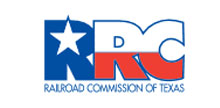As a result of the April 12 action, gas suppliers will have to follow new rules during those emergency situations when they lack sufficient supply to serve all customers.
________________________________________________
 In response to massive gas supply failures during Winter Storm Uri last year, the Texas Railroad Commission has updated its rules governing emergency service priorities.
In response to massive gas supply failures during Winter Storm Uri last year, the Texas Railroad Commission has updated its rules governing emergency service priorities.
As a result of the April 12 action, gas suppliers will have to follow new rules during those emergency situations when they lack sufficient supply to serve all customers. Agency staff first proposed the amended set of rules on November 8, although they broadly parallel guidelines set by the agency back in February after Winter Storm Uri. The Atmos Cities Steering Committee earlier expressed general support for the new rules, when they were in draft form.
In specific terms, the agency on April 12 reset its 1970s-era “Order 489” relating to gas deliveries during “curtailment events;” i.e., when gas utilities lack sufficient supply to serve all customers. The new action amends a section of the Texas Administrative Code (16 TAC § 7.455) relating to curtailment standards and likewise repeals a section of the Texas Administrative Code (16 TAC § 7.305) relating to the commission’s existing curtailment program.
Prioritizing Human-Needs Customers
Of particular importance, the rules set forth various service priorities for gas suppliers that find themselves unable to meet all of their firm delivery obligations. The rules name human-needs customers — such as residences, hospitals, water and wastewater facilities, and emergency responder facilities — as the top priority for gas service, as well as electric generation facilities. It then sets forth other customer categories, in priority-order of service. The agency’s three commissioners adopted the new rules after only a brief discussion, are they are set to take effect on Sept. 1.
“It’s vital to have an action plan for emergencies, and that’s what curtailment does,” said Railroad Commission Chairman Wayne Christian in a prepared statement. “The Commission today strengthened that plan by placing it in our rules and focusing on firm supply and transport of natural gas. This will give market participants certainty of the plan and encourage them to obtain firm contracts, increasing the reliability of the natural gas system in Texas.”
In an earlier regulatory filing, the Atmos Cities Steering Committee, a coalition of 179 cities in North and Central Texas, also expressed broad support for what then were draft rules and also suggested a number of refinements.
Attorney Thomas Brocato, writing January 7 on behalf of ACSC, noted that cities have played a historic role in ensuring reliable gas service within their municipal boundaries. As such, “ACSC appreciates the steps taken by the legislature and the Commission to ensure cities never experience the extensive power outages and struggles with adequate gas supply that occurred last February,” wrote Brocato.


